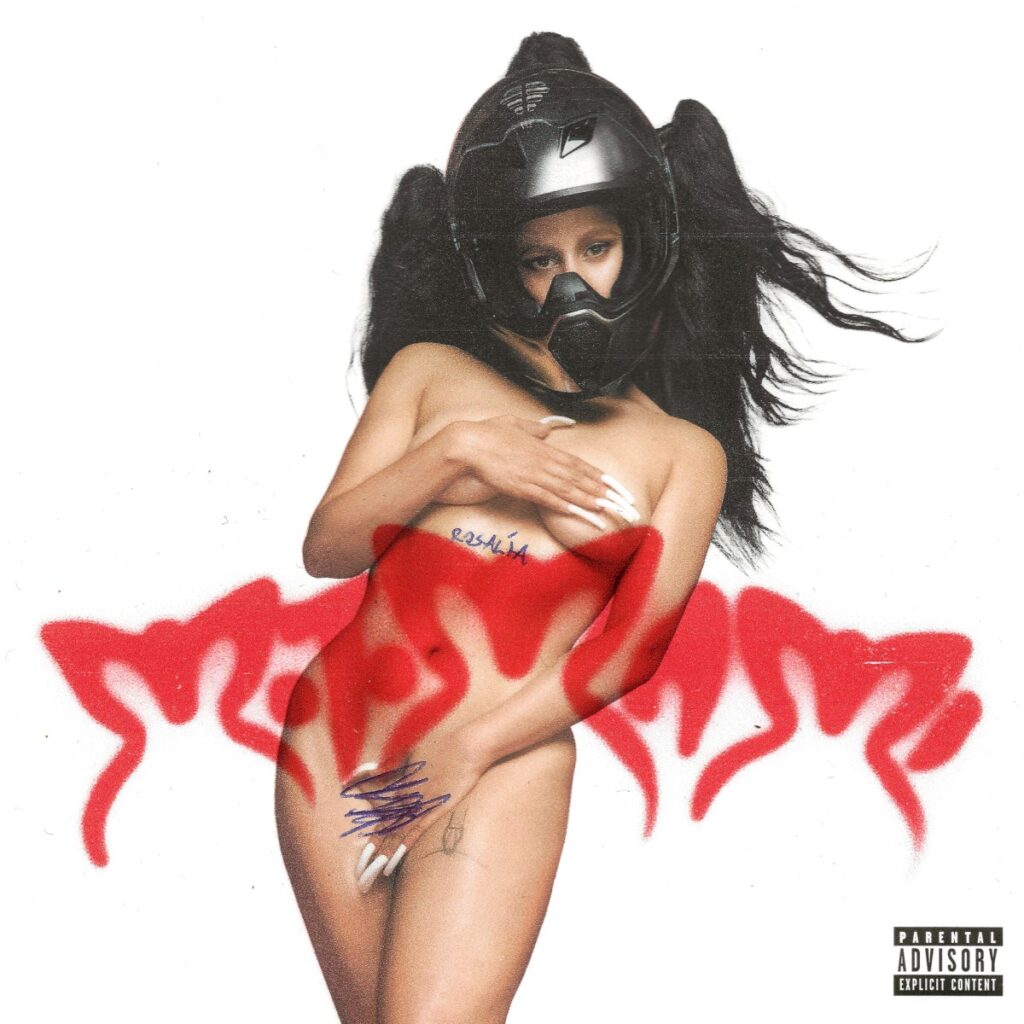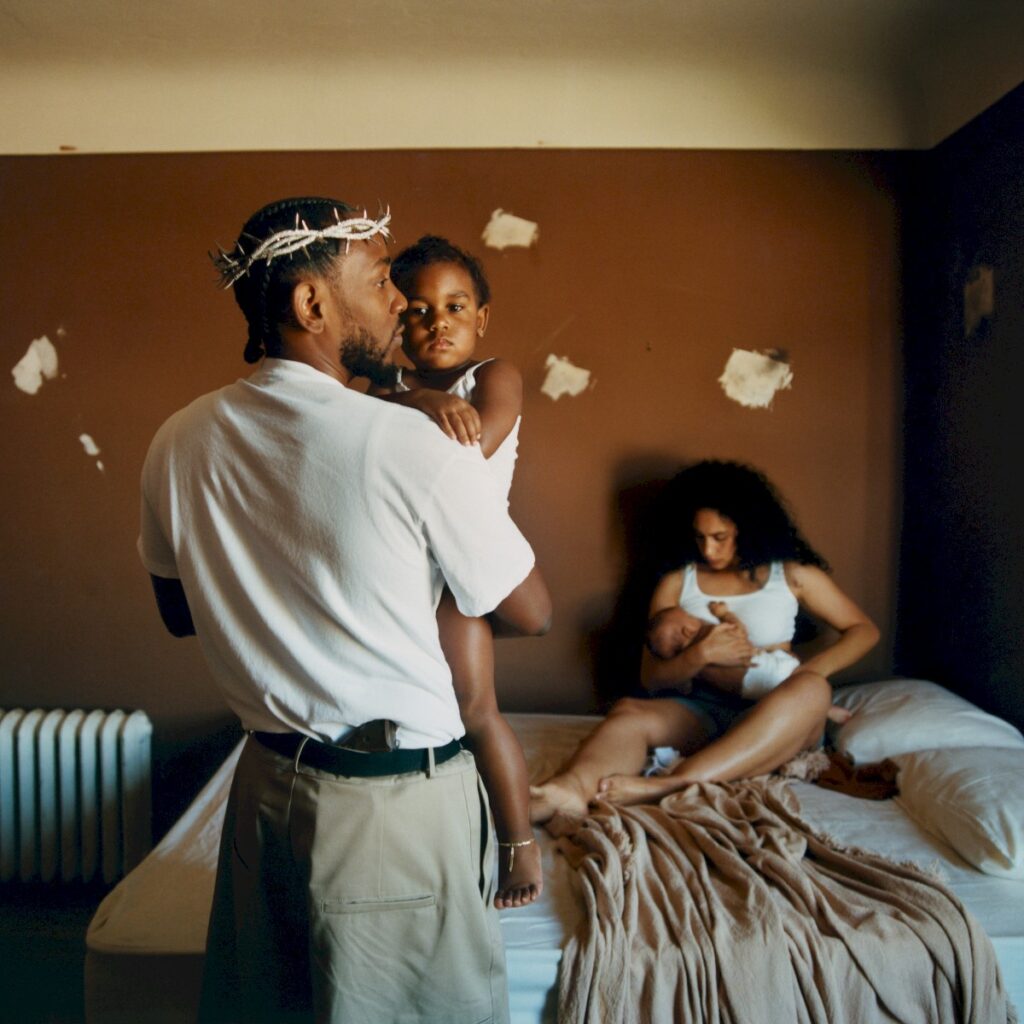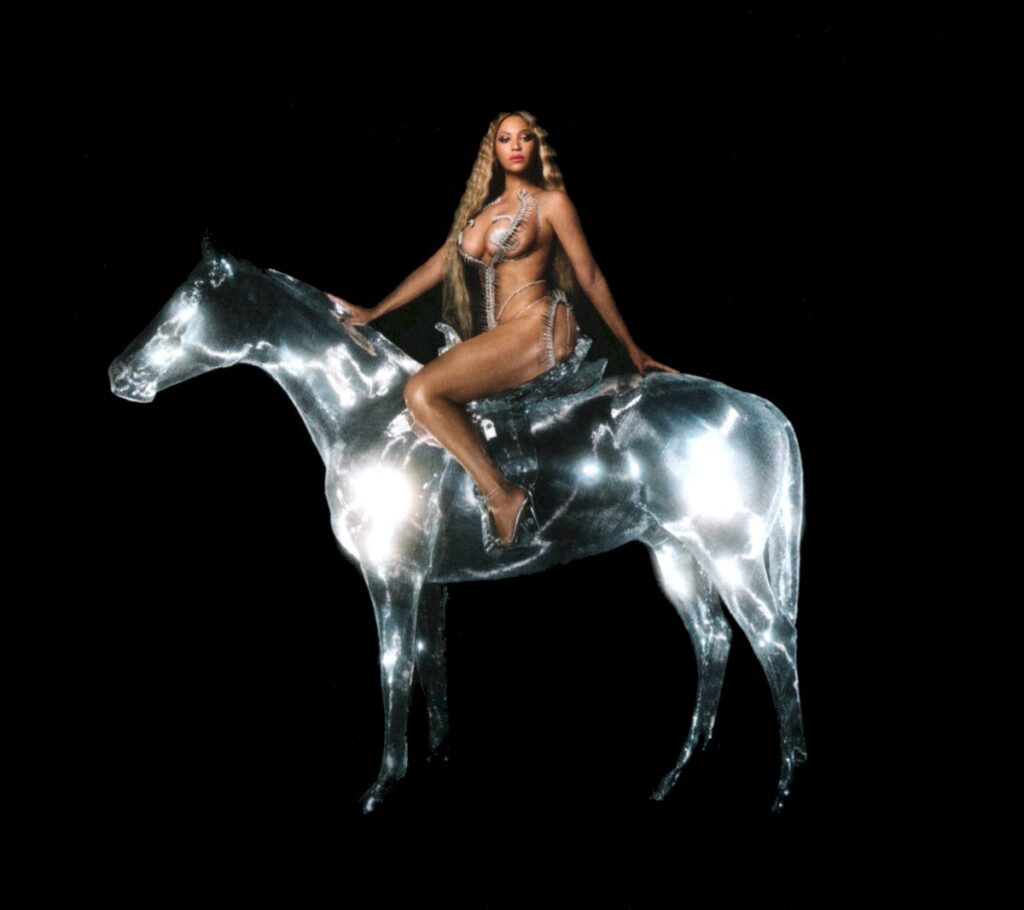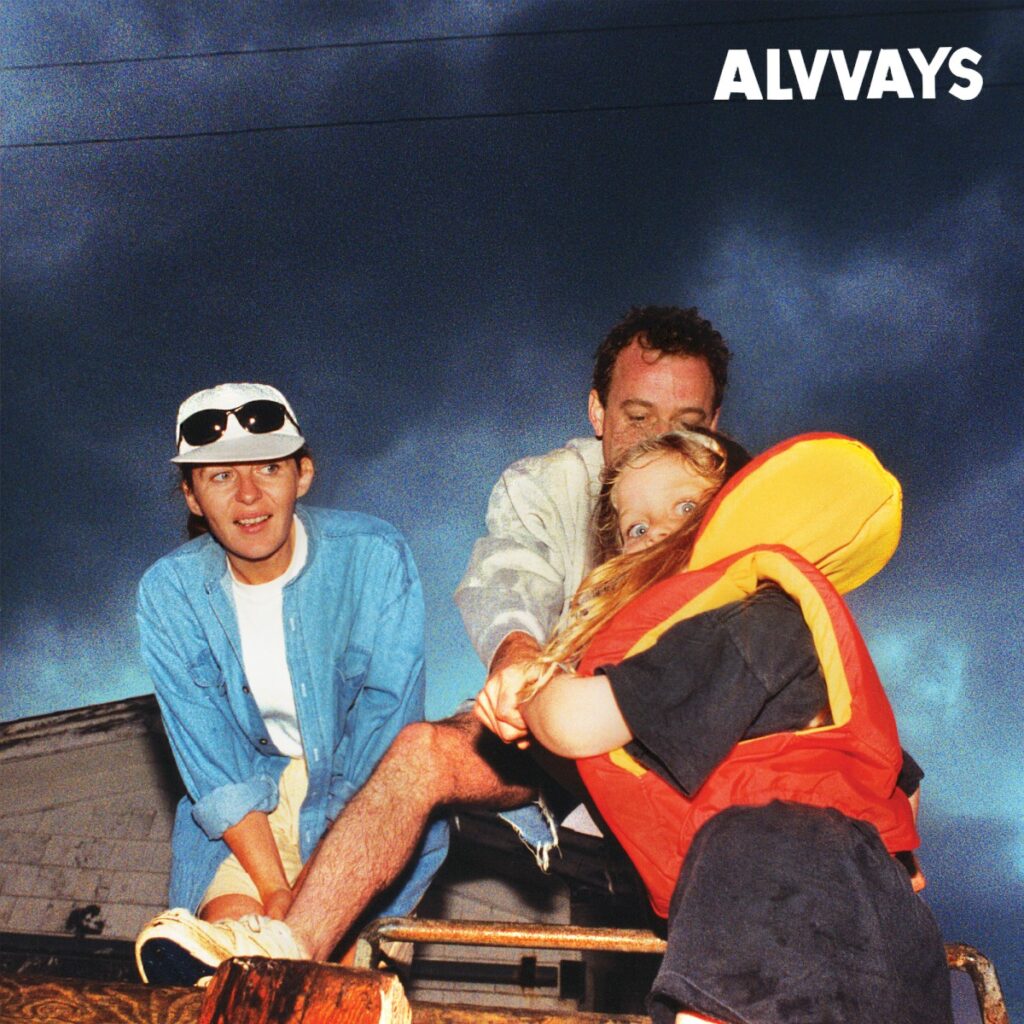Previously,
The Best 20 Albums of 2022: My Picks #20-16
The Best 20 Albums of 2022: My Picks #15-11
The Best 20 Albums of 2022: My Picks #10-6
5.
Rosalía, ‘MOTOMAMI’

Rosalía’s third album, MOTOMAMI, is a kaleidoscopic self-portrait that explores themes of transformation, duality, and self-empowerment through a rich tapestry of sounds and styles. The title itself encapsulates this tension: “Moto” implies strength and divinity, while “Mami” suggests vulnerability and femininity. Rosalía uses this framework to explore a wide range of themes, from the complexities of fame and the pangs of desire to the freedom of being single and the inevitability of death. The album’s opening, Saoko, sets the tone for the entire project. Borrowing the chorus from Puerto Rican reggaetonero Wisin’s 2004 hit Saoco, Rosalía raps about embracing change and finding peace in her inconsistencies.. This theme of transformation is a recurring motif throughout the album, as Rosalía navigates the complexities of her identity and artistic vision. La Fama, a bachata gem featuring The Weeknd, explores the dark side of fame, with lyrics inspired by Patti Smith. The song’s narrative is a cautionary tale about the seductive yet destructive nature of celebrity, rendered with perverse beauty through the pair’s harmonized hook and intricate choreography. G3 N15, is a heartfelt letter to Rosalía’s separated relatives. The melancholic song uses slow, synthesized chords that intensify as Rosalía’s voice crescendos and distorts, culminating in a voice message from her grandmother in Catalan. This intimate moment adds a deeply personal layer to the album, highlighting Rosalía’s connection to her family and roots. Musically, MOTOMAMI is a dazzling grab-bag of genres, including flamenco, reggaetón, left-field pop, glitchy R&B, and even a track best described as “despondent gospel”. Rosalía’s avant-garde approach to composition is evident in her use of sampling and genre-blending. For example, Delirio de Grandeza reimagines Cuban singer Justo Betancourt’s 1968 Fania Records weeper, adding a sample from the short-lived rap duo Vistoso Bosses’ 2009 Atlanta bass track Delirious. The album’s production is equally experimental, with Rosalía pushing her voice to the limit through over-saturation and deconstruction. She uses her voice not just as a vehicle for lyrics but as an instrument in itself, creating samples and sounds that intertwine with the rhythm.
4.
SZA, ‘SOS’

SZA’s sophomore album, SOS, is a sprawling, genre-defying opus that cements her status as one of contemporary R&B’s most innovative and introspective artists. The concept of SOS delves deeply into introspective themes, primarily centering on SZA’s journey toward self-love amidst a backdrop of self-doubt, heartbreak, and emotional upheaval. The title SOS itself is multi-faceted, referencing both the Morse code distress signal and serving as a personal reclamation of SZA’s identity. The album artwork, inspired by a vulnerable image of Princess Diana, symbolizes isolation and introspection, with SZA perched on a diving board, gazing into the sea, representing the vast and often overwhelming nature of her emotional landscape. Unlike her 2017 debut album Ctrl, which portrayed a lack of self-worth and a search for external validation, SOS marks a significant turn in SZA’s narrative. The album depicts a strenuous journey towards self-love and acceptance, showing SZA as self-assured, outspoken, and unapologetic, particularly on tracks like Conceited, Smokin on My Ex Pack, and Forgiveless. The aftermath of a heartbreak from an unfaithful ex-lover is a recurring theme on SOS. SZA traverses through jealousy, self-loathing, and a struggle with body dysmorphia, as evidenced by lyrics in “Special” where she poignantly sings, “I got pimples where my beauty marks should be / I got dry skin on my elbows and knees.” The album does not shy away from displaying her emotional scars, making it relatable and deeply human. Throughout SOS, SZA oscillates between confidence and destructive self-doubt. Songs like Kill Bill depict fantasies of revenge, while tracks like Gone Girl and Nobody Gets Me reveal an emotional dependence on her past relationship, illustrating the tumultuous path towards healing and self-realization.
SOS is a multi-genre album that blends elements of R&B, hip-hop, pop, folk, indie rock, and electronica. The album’s sound is a varied palette, drawing on influences from soul, gospel, jazz, and melodic rap. Tracks like I Hate U and Smokin on my Ex Pack showcase SZA’s versatility, with the former being an instant classic “fuck you” number and the latter a savage rap track reminiscent of the glory days of physical mixtapes. The album also ventures into unexpected territories, such as the country-pop-punk fusion of F2F and the contemplative, acoustic-driven Blind. The album’s experimental sounds and stylistic variety signal an advancement from SZA’s debut Ctrl in every respect apart from cohesion. SZA described the album’s sound as “a varied palette,” drawing on surf rock and grunge alongside lo-fi beats. This eclectic mix of genres not only keeps the album fresh but also showcases SZA’s ability to transcend traditional genre boundaries.
Inward I go when there’s no one around me
And memories drown me, the further I go
And ain’t nobody talking ’bout the damage
Pretending like it’s all okay
I tried to erase
I live to escape
3.
Kendrick Lamar, ‘Mr. Morale & the Big Steppers’

Let’s think about this for a second
Tell me what you would do for aesthetic
Would you sell your soul on credit?
Would you sell your bro for leverage?
Where the hypocrites at?
What community feel
They the only ones relevant?
Kendrick Lamar’s fifth studio album, Mr. Morale & the Big Steppers, marks a significant return for the Compton rapper after a five-year hiatus since his critically acclaimed DAMN. Mr. Morale & the Big Steppers is a concept album that serves as a cathartic, soul-baring autobiography. The album is split into two nine-track discs, each offering a different perspective on Lamar’s life and struggles. The first disc, “Big Steppers,” focuses on Lamar’s external experiences and societal observations, while the second disc, “Mr. Morale,” delves into his internal battles and personal growth. The album’s themes are deeply personal and often uncomfortable. Lamar addresses childhood and generational trauma, infidelity, and the pressures of fame. He also tackles broader societal issues such as cancel culture, performative activism, and the worship of celebrity. The album’s candid and confessional nature makes it a fair thing to say that Mr. Morale & the Big Steppers is Lamar’s most introspective work to date.
Like always, Lamar’s lyrical prowess is on full display throughout his album. In the opening track United in Grief, Lamar reflects on the 1,855 days since the release of DAMN, setting the stage for a deeply personal narrative. The album’s lyrics are a mix of self-evaluation and social critique, often blurring the lines between the two. Tracks like N95 and Savior highlight Lamar’s dissatisfaction with the culture of celebrity worship and the unrealistic expectations placed on public figures. In Savior, he reminds listeners that he is not their savior, despite the profound impact of his music. The album also features moments of vulnerability, such as in Mother I Sober, where Lamar confronts his personal demons and the generational trauma that haunts him. Tracks like Count Me Out, Father Time, and Die Hard showcase Lamar’s ability to blend melodic rap with darker, more melancholic tones. Silent Hill, featuring Kodak Black, offers a lighter, more playful vibe, while We Cry Together, featuring Taylour Paige, is a raw and intense portrayal of a toxic relationship.
Musically, Mr. Morale & the Big Steppers incorporates elements of free jazz, funk, psychedelic jazz, blues, quiet storm, R&B, soul, trap, and West Coast hip hop. The array from minimalist hip-hop beats to lush, soulful arrangements complement Lamar’s introspective lyrics. Tracks like Die Hard and Silent Hill exemplify this sonic diversity, blending dark guitar riffs with melodic rap tones and playful, animated vocal deliveries. The album features narration by Whitney Alford and spiritual teacher Eckhart Tolle, adding an additional layer of depth to the storytelling. Unlike his universally acclaimed To Pimp A Butter Fly and good kid, m.A.A.d city, Mr. Morale & the Big Steppers witnesses Lamar’s bravery in baring his soul and confronting his flaws. The album’s raw honesty and emotional intensity make it a gripping listen, even if it is not always a comfortable one. The album is a testament to a complicated soul with a lot more work to do, reflecting the messy and unpredictable nature of real life.
I love my father for tellin’ me to take off the gloves
‘Cause everything he didn’t want was everything I was
And to my partners that figured it out without a father
I salute you, may your blessings be neutral to your toddlers
It’s crucial, they can’t stop us if we see the mistakes
‘Til then, let’s give the women a break, grown men with daddy issues
2.
Beyoncé, ‘RENAISSANCE’

Bet you you’ll see far
Bet you you’ll see stars
Bet you you’ll elevate
Bet you you’ll meet God
‘Cause I feel like fallin’ in love
I’m in the mood to fuck somethin’ up
‘Cause we gon’ fuck up the night
Beyoncé’s seventh studio album, RENAISSANCE, is a masterclass in musical evolution, a vibrant tapestry that weaves together the rich history of Black dance music with contemporary sounds. Released in 2022, the post-COVID-pandemic era, this album marks a significant departure from her previous works, focusing on the dance floor rather than the personal and political narratives that characterized Lemonade and her self-titled visual album.
RENAISSANCE is a pandemic-born project, conceptualized and recorded over the past two years as a form of escapism during a time of global uncertainty. Beyoncé herself described the album as a “safe place, a place without judgment, a place to be free of perfectionism and overthinking.” The album is a tribute to Black joy, queer culture, and the liberation found in dance. It is a celebration of the communities that have shaped dance music, from the underground house scenes of the ’80s and ’90s to the ballroom culture that has provided a haven for queer people of color. Beyoncé dedicates the album to her late Uncle Jonny, who was gay and died of complications from HIV, and to the “pioneers who originate culture… the fallen angels whose contributions have gone unrecognized for far too long.” This dedication sets the tone for an album that is both a tribute and a reclamation of space for marginalized communities. The album’s concept is rooted in the idea of liberation and self-expression. Beyoncé invites listeners to “release the wiggle” and embrace their true selves without judgment. This theme of freedom is evident in tracks like Break My Soul and Cuff It, where she encourages listeners to let go of their burdens and dance their way to liberation. Lyrically, RENAISSANCE is a departure from the introspective and often somber tone of Lemonade. Instead, it is filled with braggadocio and celebration. Beyoncé’s lyrics are a mix of self-empowerment anthems and playful, sensual explorations. In I’m That Girl, she declares, “I’m the only one / Don’t even waste your time trying to compete with me,” setting the stage for an album that is unapologetically confident. In Alien Superstar, she declares, “I got diamonds beneath my thighs where his ego will find bliss,” a line that references both her 2009 single “Ego” and Maya Angelou’s poem “Still I Rise.” This duality is a recurring motif throughout the album, where moments of vulnerability are juxtaposed with bold declarations of confidence.
The album’s composition is a sonic journey through various genres of dance music. From the plastic sheen of ’80s radio pop to the brash beats of ballroom competitions, RENAISSANCE is a guided tour of Black dance-music history. Tracks like Pure/Honey and Alien Superstar juxtapose different styles, creating a dynamic and eclectic soundscape. Thique blends menacing, downtempo southern trap with zesty four-on-the-floor drums, while Move and Heated luxuriate in the low-register flirtations of Drake jams. The album’s lead single, Break My Soul, features a sample of Robin S.’s Show Me Love and contributions from Big Freedia, creating a track that is both a nod to ’90s vocal house music and a celebration of New Orleans bounce.
RENAISSANCE is an artpiece born in a time that it is needed. The album has the audience shake off the COVID depression; also, it is a love letter to Black and queer club culture and a bold statement of self-liberation. As we listen to RENAISSANCE, we are reminded of the power of music to unite, liberate, and inspire. Beyoncé has once again proven that she is not just a pop star, but a cultural icon who uses her platform to uplift and empower marginalized communities. In a world that often seeks to divide, RENAISSANCE is a much-needed reminder of our shared humanity and the joy that comes from embracing our true selves.
You don’t need no excuse
To touch somebody (touch me)
To love somebody (love me)
To trust somebody (will you trust me?)
Now go ahead and hug somebody ’cause I can see the light in you
Everybody want somebody (I want you)
Everybody got somebody (I got you)
So come over and want my body
1.
Alvvays, ‘Blue Rev’

At night I take the calls from telemarketers
In hopes of hearing your drawl
I let them blather on
Without a thought I surrender my credit card
‘Cause I’m still combing through missed connections
I shouldn’t have ever followed you up
I’m out here, swimming in the wrong direction
I shouldn’t have ever been calling it love
Alvvays’ third studio album, Blue Rev, is named after an alcoholic soda drink that lead singer Molly Rankin and keyboardist Kerri Maclellan enjoyed during their teenage years. This nostalgic reference sets the tone for the album, which is steeped in themes of reminiscence, heartbreak, and the bittersweet nature of growing up. Rankin’s vocal delivery also shows a new level of confidence, often interfacing between sardonic wit and heartfelt confession. The lead single Easy On Your Own? discusses the melancholia of wasted time and life’s semblance of stagnation versus evolution. On the other end of the spectrum, Velveteen features Rankin’s most vulnerable and piercing vocal performance to date, which delves into themes of romantic confusion and emotional turmoil, culminating in a stunning falsetto belt that leaves a lasting impression. Very Online Guy is a standout track that takes a witty jab at internet culture, with Rankin singing about a character who “types his cool replies” and is “only one filter away,” blending humor with sharp social commentary.
It’s their most achingly melancholic material that shines brightest, and Tile by Tile might just be the most heartbreakingly lonely song that the band has ever written: “At night I take the calls from telemarketers in hopes of hearing your drawl.” From the band’s first single, the HOF indie rock jam Archie, Marry Me to now, Molly Rankin’s literary flair has never been pretentious, only wise. When she’s helpless, she’s “an assistant to the way life’s shaking out”; if she wants to leave, she will “egress”; she’s not single, she’s “riding the pine.”
Blue Rev is a rich tapestry of jangly guitars, lush reverb, and intricate layers of sound. The Grammy-winning producer Shawn Everett encouraged the band to record full takes of the album straight through, a departure from their usual meticulous approach. This method brought a raw energy and spontaneity to the recordings, evident in the driving percussion and rhythm that permeate the album. The album’s opener, Pharmacist, exemplifies this approach by combining jangly shoegaze-like guitar strumming with a punchy, emotional narrative. Tracks like After The Earthquake and Many Mirrors highlight Alvvays’ jangly indie pop side, while more ambitious cuts like Tile By Tile and Belinda Says stand out for their bold instrumentation and dynamic arrangements. Belinda Says, in particular, cranks its instrumentation to a level that feels like a light-on-its-feet take on shoegaze, blending loud, distorted guitars with sweet, melodic hooks. Recorded in a single day, the album is the result of two front-to-back takes, separated only by a 30-minute break. That approach, which recalls the Bad Brains’s legendary Black Dots sessions, is palpable throughout, and even as the band creates some of its lushest moments on tracks like Tom Verlaine, their playful edge never fails to bleed through.
Blue Rev careens between the sublime and the extremely sick, soothing one moment and whipping you back against your seat the next. It is cool and righteous, it makes you feel cool and righteous, you hope that when other people hear it they feel cool and righteous. This is the old currency of pop music, and Blue Rev makes it feel new again.
I’ll egress to Inverness with nothing in my pocket
Belinda says that heaven is a place on earth
Well so is hell
And we’ll all get help, paradise
And we’ll start another life
Continue Reading:
The Best 20 Albums of 2023: My Picks